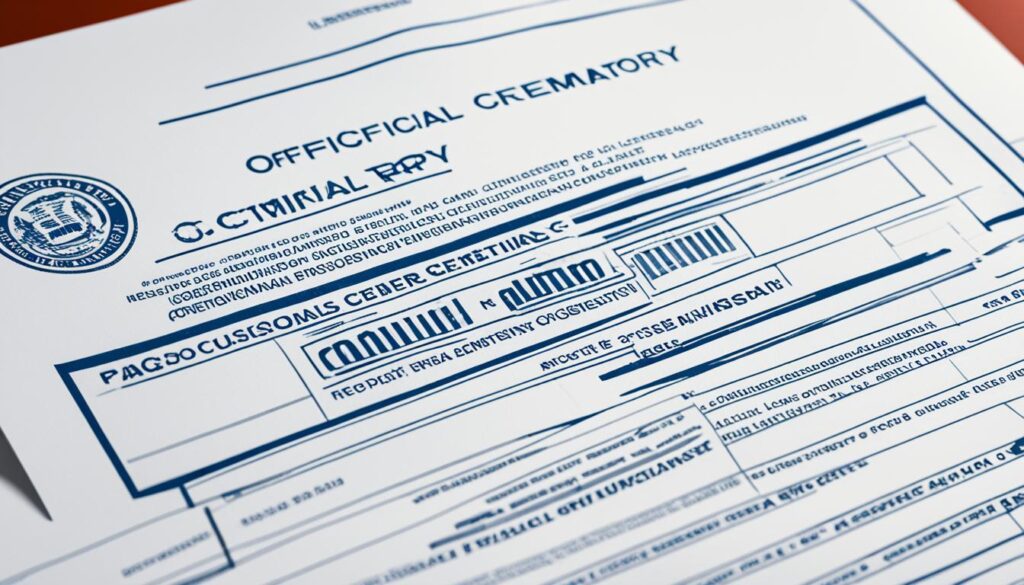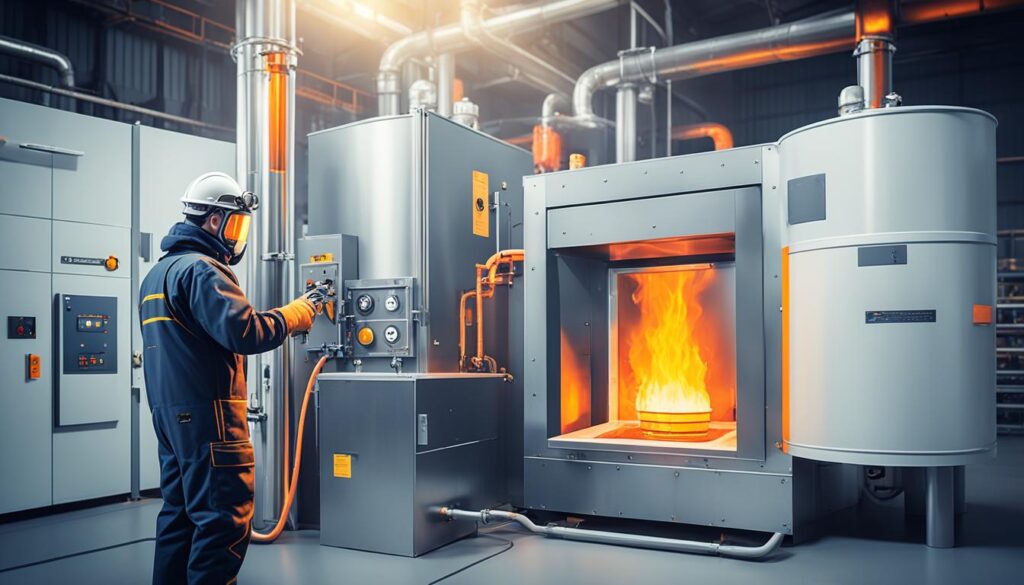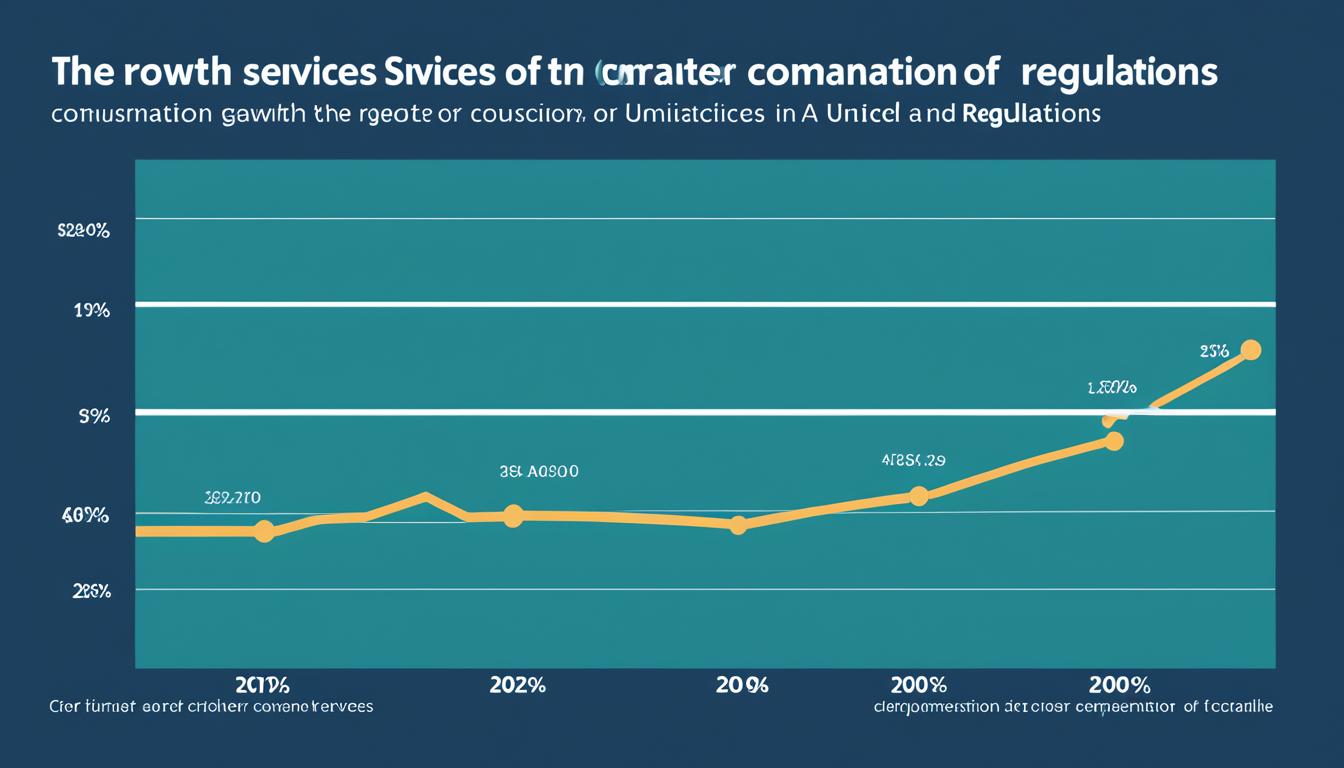Did you know that cremation rates have surpassed traditional burial rates in several markets? The cremation services industry has experienced a steady rise in demand over recent years, largely due to shifting cultural attitudes towards death and funerals. If you’re considering starting a cremation business, now is an opportune time to enter this growing market.
However, starting a cremation business requires substantial planning, compliance with regulations, and appropriate facilities and equipment. It’s essential to research the competition and saturation levels in your region, project your return on investment (ROI), and secure finances through local banks or outside finance companies. Choosing a suitable location that meets zoning requirements and has the necessary gas and electrical requirements is crucial. Your cremation business plan should also consider ongoing expenses such as fuel, property lease/rent, equipment finance, payroll, taxes, marketing, and equipment maintenance.
Meeting legal requirements and obtaining necessary licenses is critical in the cremation services sector due to the intricate regulatory landscape that varies significantly across jurisdictions. Failure to comply can result in substantial legal issues, so it’s essential to navigate the complex web of funeral home regulations and crematory permits and licenses.
Starting a cremation services business requires a substantial initial capital investment, including real estate, specialized equipment like cremation chambers, and ongoing operational costs such as utilities and staffing. Comprehensive market research is essential in understanding the target demographic, competitive cremation services pricing strategies, and identifying market gaps to tailor services effectively and resonate with the intended audience.
Key Takeaways
- Cremation rates have surpassed traditional burial rates in several markets, indicating a growing demand for cremation services.
- Starting a cremation business requires substantial planning, compliance with regulations, and appropriate facilities and equipment.
- Research competition, project ROI, secure finances, and choose a suitable location that meets zoning requirements and has necessary utilities.
- Meeting legal requirements and obtaining necessary licenses is critical due to the intricate regulatory landscape that varies across jurisdictions.
- Substantial initial capital investment is required, including real estate, specialized equipment, and ongoing operational costs.
- Comprehensive market research is essential to understand the target demographic, competitive pricing strategies, and identify market gaps.
Understand the Cremation Industry
To establish a successful cremation business, it is crucial to have a deep understanding of the industry and the unique needs of your target market. By conducting thorough research into current cremation industry trends and analyzing relevant statistics, you can gain valuable insights that will help you make informed decisions and position your business for success.
Research Current Trends and Statistics
Staying up-to-date with the latest cremation industry trends is essential for providing high-quality services that meet the evolving needs of your clients. Some key trends to consider include:
- The increasing popularity of cremation over traditional burial
- The growing demand for personalized and meaningful cremation services
- The rise of eco-friendly and green cremation options
- The importance of transparent and competitive cremation services pricing
By researching these trends and analyzing relevant statistics, such as cremation rates in your area and the demographic profile of your potential clients, you can develop a comprehensive understanding of the market and identify opportunities for growth and differentiation.
Identify Your Target Market
To effectively reach and serve your potential clients, it is essential to have a clear understanding of your target market. Consider factors such as age, income, cultural background, and religious beliefs when identifying the specific segments of the population that are most likely to require cremation services.
By tailoring your cremation marketing strategies and customer service approach to the unique needs and preferences of your target market, you can foster trust, build lasting relationships, and establish your business as a respected provider in the community. Engaging with local communities through educational sessions and establishing an informative online presence where questions are answered transparently can help transform initial curiosity into long-term connections and loyalty.
Develop a Comprehensive Business Plan
Embarking on a cremation business venture requires meticulous planning and a well-structured approach. To ensure the success of your cremation services, it is crucial to develop a comprehensive business plan that outlines your objectives, strategies, and financial projections. By taking the time to carefully craft your cremation business plan, you lay the foundation for a thriving and sustainable enterprise.
Define Your Business Structure
One of the first steps in creating your cremation business plan is to define your business structure. Consider the various legal entities available, such as sole proprietorship, partnership, limited liability company (LLC), or corporation. Each structure has its own advantages and disadvantages, so it is essential to consult with a legal professional or accountant to determine the best fit for your cremation business. Your chosen structure will impact your personal liability, tax obligations, and overall management of the company.
Establish Financial Projections
A critical component of your cremation business plan is establishing financial projections. This involves forecasting your expected revenue, expenses, and profitability over a specific period, typically three to five years. To develop accurate financial projections, consider factors such as cremation services pricing, market demand, competition, and industry trends. Include a detailed breakdown of your startup costs, including real estate, cremation equipment, utilities, and staff salaries. By having a clear understanding of your financial landscape, you can make informed decisions and attract potential investors or lenders.
Outline Marketing Strategies
To successfully launch and grow your cremation business, it is vital to outline effective marketing strategies in your business plan. Consider your target market and identify the most effective channels to reach them. This may include developing a strong online presence through a website and social media platforms, engaging with local communities through educational events, and forming partnerships with funeral homes and other related businesses. Your cremation marketing strategies should aim to build brand awareness, establish trust, and differentiate your services from competitors. By allocating resources to targeted marketing efforts, you can attract new clients and foster long-term relationships.
Remember, your cremation business plan is a living document that should be regularly reviewed and updated as your business evolves. It serves as a roadmap, guiding your decision-making processes and helping you stay focused on your goals. By investing time and effort into developing a comprehensive business plan, you set the stage for a successful and thriving cremation business that provides compassionate and dignified services to families in their time of need.
Secure Necessary Funding
Launching a successful cremation business requires a significant financial investment. To secure the necessary funding, it’s essential to work closely with your local bank or explore financing options through your equipment provider. Many reputable cremation equipment suppliers have established partnerships with outside finance companies, streamlining the process of obtaining the capital you need to get your business up and running.
When seeking funding, it’s crucial to have a clear understanding of the various costs associated with setting up and operating a crematorium. Some of the primary expenses to consider include:
- Cremation chambers: The heart of your operation, these specialized furnaces are designed to efficiently and respectfully cremate human and pet remains.
- Processing stations: These areas are dedicated to the preparation and handling of cremated remains, ensuring a dignified and organized process.
- Loading tables: Sturdy and reliable loading tables are essential for safely transferring remains into the cremation chamber.
- Safety wear: Protecting your staff is paramount, so investing in high-quality aprons, gloves, and goggles is a must.
- Urns: Offering a selection of urns allows families to choose a fitting final resting place for their loved one’s ashes.
- Cleaning tools: Maintaining a pristine and hygienic environment is crucial, so allocating funds for proper cleaning equipment is essential.
In addition to the upfront costs of cremation equipment, it’s important to factor in the ongoing expenses associated with operating a crematorium. These may include property lease or rent, utilities, maintenance, and staff salaries. Furthermore, obtaining the necessary crematory permits and licenses often comes with associated fees that must be accounted for in your financial planning.
By working closely with financial experts and experienced professionals in the cremation industry, you can develop a comprehensive funding strategy that positions your business for long-term success. Remember, investing in quality equipment and prioritizing regulatory compliance are key to establishing a reputable and thriving cremation business.
Choose a Prime Location
Selecting the perfect location for your cremation business is a crucial step in ensuring its success. When considering potential sites, it’s essential to take into account local zoning requirements and regulations surrounding funeral home operations. Start by contacting the Zoning and/or Planning Department in the township, city, or county where the property is located to obtain a clear ruling on the suitability of the site for a crematory.

Once you’ve confirmed that the property is properly zoned for a crematory, you’ll need to evaluate its accessibility and visibility for potential clients. Ideally, your cremation business should be situated in a location that is easy to find and reach, with ample parking and clear signage. This will not only make it more convenient for grieving families to access your services but also help to establish your business as a reputable and professional provider in the community.
Consider Zoning Requirements
Before committing to a location, it’s crucial to ensure that the property meets all necessary gas and electrical requirements for operating a crematory. This may involve working closely with local utility providers to assess the site’s infrastructure and make any necessary upgrades or modifications. Additionally, you’ll need to familiarize yourself with any specific funeral home regulations or crematory permits and licenses required by your state or local government.
Evaluate Accessibility and Visibility
When evaluating potential locations for your cremation business, consider factors such as:
- Proximity to major highways and transportation hubs
- Visibility from the street and surrounding areas
- Availability of parking and ease of access for clients
- Compatibility with neighboring businesses and land uses
By carefully assessing these factors and working closely with local zoning authorities and utility providers, you can identify a prime location that sets your cremation business up for long-term success while ensuring compliance with all relevant regulations and standards.
Obtain Required Licenses and Permits
When starting a cremation business, navigating the regulatory landscape is essential to ensure compliance with state and local laws. Before opening your doors, you’ll need to obtain the necessary crematory permits and licenses, adhere to funeral home regulations, and factor in cremation equipment costs.
To begin the process, research the specific licensing requirements for your state and locality. This information can typically be found through your state’s funeral board or the local department of health. You’ll likely need to submit an application, pay a fee, and undergo an inspection of your facility before receiving your license to operate.
Research State and Local Regulations
In addition to obtaining a business license, you’ll need to familiarize yourself with the funeral home regulations that apply to crematories in your area. These regulations may cover topics such as:
- Recordkeeping and documentation requirements
- Handling and storage of human remains
- Cremation procedures and protocols
- Facility and equipment standards
- Staff training and certification
Consulting with an attorney who specializes in the death care industry can help you navigate the complex regulatory environment and ensure that you’re in compliance with all applicable laws.
Comply with Environmental Standards
Another critical aspect of obtaining crematory permits and licenses is complying with environmental standards. Cremation involves the release of emissions, and many states have specific regulations in place to minimize the environmental impact.
In most cases, you’ll need to secure approval from your state’s environmental protection agency or air quality division before installing and operating your cremation equipment. This process may involve submitting an application, providing detailed information about your equipment and its emissions control features, and undergoing periodic inspections to ensure ongoing compliance.
When budgeting for your cremation business, be sure to factor in the costs associated with obtaining permits and licenses, as well as any ongoing expenses related to maintaining compliance with funeral home regulations and environmental standards. By taking a proactive approach to regulatory compliance, you can avoid costly fines and legal issues down the road, while also demonstrating your commitment to responsible and ethical business practices.
Invest in Quality Cremation Equipment
When starting a cremation business, investing in high-quality cremation equipment is crucial for providing respectful and dignified services to your clients. Choosing the right equipment not only ensures efficient operations but also helps you comply with industry regulations and maintain competitive cremation services pricing. As cremation industry trends continue to evolve, it’s essential to select equipment that can adapt to changing demands and keep your cremation equipment costs under control.

Select Appropriate Cremation Chambers
The heart of your cremation facility is the cremation chamber. When selecting a cremation chamber, consider the following factors to ensure it meets your business needs:
- Capacity: Choose a chamber that accommodates both human and pet cremations, depending on the services you plan to offer.
- Fuel efficiency: Opt for a chamber with advanced fuel efficiency features to minimize your cremation equipment costs and maintain competitive cremation services pricing.
- Emissions control: Ensure that the chamber complies with air quality and environmental regulations in all 50 states. Our equipment features an automatic operating system that ensures complete combustion and minimal emissions.
- Ease of use: Look for a chamber with a user-friendly interface, such as a color touch screen control, which provides easy operation and monitoring of the cremation process.
- Aesthetics: Consider a chamber with an aesthetically pleasing design, such as a stainless steel finish, suitable for family viewing.
Acquire Essential Accessories and Supplies
In addition to the cremation chamber, you’ll need to acquire essential accessories and supplies to ensure smooth operations and maintain high standards of service. These include:
- Processing stations: These stations are used for processing cremated remains and preparing them for return to the family.
- Loading tables: Loading tables facilitate the safe and dignified transfer of the deceased into the cremation chamber.
- Safety wear: Provide your staff with appropriate safety wear, such as aprons, gloves, and goggles, to ensure their well-being and maintain a professional appearance.
- Urns and memorial products: Offer a selection of high-quality urns and memorial products to meet the diverse needs and preferences of your clients.
- Identification discs: Use identification discs to ensure the secure tracking and identification of cremated remains throughout the process.
- Cleaning tools: Maintain a clean and hygienic facility with appropriate cleaning tools and supplies.
When selecting cremation equipment and supplies, work with a reputable provider who can guide you through the process and offer ongoing support. Look for a provider that offers comprehensive training programs, a warranty on equipment, and 24/7 technical assistance. By investing in quality cremation equipment and partnering with a trusted provider, you can establish a strong foundation for your cremation business, manage cremation equipment costs effectively, and adapt to evolving cremation industry trends while providing exceptional service to your clients. For more information on cremation equipment, visit US Cremation Equipment FAQ.
Hire and Train Compassionate Staff
Building a successful cremation business relies heavily on the quality and compassion of your staff. As you embark on this journey, it’s crucial to assemble a team of experienced professionals who share your vision and commitment to providing exceptional cremation customer service.
Recruit Experienced Professionals
When recruiting staff for your cremation business, seek out individuals with a background in funeral services, grief counseling, or customer service. Look for candidates who demonstrate:
- Empathy and sensitivity towards grieving families
- Strong communication and interpersonal skills
- Attention to detail and adherence to protocols
- Ability to work well under pressure and maintain composure
Consider reaching out to local funeral service schools, industry associations, and job boards to attract qualified candidates who are passionate about providing compassionate care.
Provide Comprehensive Training Programs
Once you have assembled your team, invest in comprehensive cremation staff training programs to ensure they are well-equipped to handle the unique challenges of the industry. Your training program should cover:
- Technical aspects of cremation, including equipment operation and maintenance
- Grief counseling techniques and effective communication strategies
- Customer service best practices and conflict resolution
- Legal and ethical considerations in the cremation industry
- Self-care and stress management for staff members
By providing ongoing training and support, you empower your team to deliver the highest level of service while safeguarding their own mental and emotional well-being. Encourage open communication, regular check-ins, and opportunities for professional development to foster a supportive and cohesive work environment.
Implement Effective Marketing Strategies
To succeed in the competitive cremation industry, developing a comprehensive marketing strategy is essential. By focusing on building a strong online presence and engaging with local communities, you can effectively reach potential clients and establish your cremation business as a trusted provider of exceptional services.
Develop a Strong Online Presence
In today’s digital age, having a user-friendly website is crucial for attracting and informing potential clients. Ensure that your website provides clear, concise information about your cremation services, pricing, and the unique value you offer. Leverage SEO strategies to optimize your website’s visibility in online searches, making it easier for those in need to find and connect with your business. Consider incorporating informative blog posts, FAQs, and testimonials to build trust and credibility with your target audience.
Engage with Local Communities
Building strong relationships with local communities is key to the success of your cremation business. Engage with potential clients by hosting educational sessions that demystify the cremation process and highlight the benefits of choosing this option. Partner with local funeral homes, hospices, and bereavement groups to expand your network and reach those who may benefit from your services. Utilize social media platforms to connect with your audience on a more personal level, sharing valuable resources, offering support, and showcasing your commitment to providing compassionate care during difficult times. By consistently delivering exceptional cremation customer service and staying attuned to the latest cremation industry trends, you can foster lasting connections and build a loyal client base.
FAQ
What are the essential steps to start a cremation business?
How much does it cost to set up a cremation business?
What licenses and permits are required to operate a cremation business?
How do I choose the right location for my cremation business?
What kind of cremation equipment do I need to start a cremation business?
How can I market my cremation business effectively?
What are the current trends in the cremation industry?
How can I ensure excellent customer service in my cremation business?
Author
-

Lucas Martinez is an accomplished entrepreneur with a passion for startups. He has launched and scaled multiple businesses, providing pragmatic advice on starting and growing a business.
View all posts



